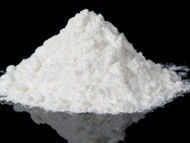Creatine For Muscle Growth
Posted by Leah Arrowsmith on 24th Apr 2018
When used correctly, creatine is able to help produce solid growth and strength gains, it is produced naturally within the body during protein metabolization and is one of the major building blocks of protein, which in turn is the main building block of muscle tissue. It is readily available in many protein-rich foods, such as fish and red meat. However, to be able to ingest a sufficient amount of creatine, the individual would need to consume an extremely large quantity of these food products to notice any benefits.

How Exactly Does Creatine Work?
Once ingested, creatine gets to work by regenerating adenosine triphosphate, which is a molecule responsible for providing energy for the body. When the levels of creatine become depleted in the muscles, the body's ability to produce adenosine triphosphate declines rapidly and the individual will experience a reduction in available energy. Creatine provides sufficient regeneration of ATP and allows the body to be able to increase its power output, muscle mass, and strength. The average person retains enough ATP for approximately 10 seconds of exercise at a high intensity, after which more needs to be produced by the body to continue at the same pace.
When the individual supplements with creatine, the phosphocreatine stores in the body increase, which assist with the production of continuous ATP throughout high-intensity exercises (1). Alongside increasing ATP production, it also possesses other functions on the cells of the muscles in various other ways. It is thought that creatine has the potential to lead to an increase of IGF-1, which is also known as Insulin-Like Growth Factor and is one of the hormones responsible for muscle growth (2). One of the better-known benefits of creatine use over a long period of time is its ability to help the individual workout harder and for longer with each training session (3).
Creatine Helps Build Muscle Mass
When it comes to building muscle mass using legal supplements, there are only a handful that directly facilitates with muscle growth when used in combination with exercise. Of all the supplements available, creatine is backed by much scientific support and is the most effective of all (4). The effects of creatine phosphate and creatine monohydrate on muscle mass gains and strength increases were monitored in one study. The study concluded that creatine was able to add 2.6 kilograms of muscle mass amongst well-trained athletes, along with the ability to add 32 kilograms to a leg press and 11 kilograms to a bicep curl (5). When more than 150 evidence-based studies were reviewed, it was discovered that those who use creatine experienced a reduction of 3.2% body fat and an increase of 2.2% lean body mass (6).
Is Creatine Safe to Supplement With?
There are various outlets on the internet that claim that creatine is a potentially dangerous and unsafe supplement to use. However, there is no evidence available to back up these claims and all scientific studies conducted have shown the opposite to be true (7). As is possible with all supplements, there is always a very small percentage of people who receive no benefits from its use. Supplementing with creatine may also be especially beneficial for vegetarians and vegans as ATP stores can be affected by a lack of animal protein intake.
How Does Creatine Help Boost Muscle Mass?
Creatine possesses the ability to help increase muscle mass and strength in several different ways. These include improving the signals sent by cells, which helps with the repairing of muscle fibers leading to growth. As noted above, creatine also works on anabolic hormones, including IGF-1 and allows the cells of the muscles to retain more water, leading to a volumizing effect. Creatine may also be able to prevent muscle breakdown, therefore leading to an increase in the overall lean muscle mass. Finally, it has been shown to reduce the levels of myostatin, which is a protein that has the ability to prevent muscle growth (8).
Final Thoughts on Creatine Use
All in all, creatine has been shown to be extremely effective for assisting with the growth of new muscle tissue. It has also shown itself to have a proven track record of safety and can help lead to strength and muscle gains when combined with regular exercise. When creatine is used as directed, it enables the individual to lay down the foundations for a more intense workout, which ultimately leads to the development of muscle mass and a reduction of body fat over the long term.
References:
1-https://www.ncbi.nlm.nih.gov/pubmed/10919967
2-https://www.ncbi.nlm.nih.gov/pubmed/18708688
3-https://www.ncbi.nlm.nih.gov/pubmed/20847704
4-https://www.ncbi.nlm.nih.gov/pmc/articles/PMC2048496/
5-https://journals.lww.com/nsca-jscr/abstract/1999/02000/effect_of_oral_creatine_monohydrate_and_creatine.1.aspx
6-https://www.ncbi.nlm.nih.gov/pubmed/12945830
7-https://www.ncbi.nlm.nih.gov/pmc/articles/PMC2048496/
8=https://www.ncbi.nlm.nih.gov/pubmed/20026378
